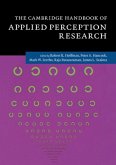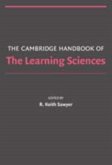Cambridge Handbook of Motivation and Learning (eBook, PDF)


Alle Infos zum eBook verschenken

Cambridge Handbook of Motivation and Learning (eBook, PDF)
- Format: PDF
- Merkliste
- Auf die Merkliste
- Bewerten Bewerten
- Teilen
- Produkt teilen
- Produkterinnerung
- Produkterinnerung

Hier können Sie sich einloggen

Bitte loggen Sie sich zunächst in Ihr Kundenkonto ein oder registrieren Sie sich bei bücher.de, um das eBook-Abo tolino select nutzen zu können.
Written by leading researchers in educational and social psychology, learning science, and neuroscience, this edited volume is suitable for a wide-academic readership. It gives definitions of key terms related to motivation and learning alongside developed explanations of significant findings in the field. It also presents cohesive descriptions concerning how motivation relates to learning, and produces a novel and insightful combination of issues and findings from studies of motivation and/or learning across the authors' collective range of scientific fields. The authors provide a variety of…mehr
- Geräte: PC
- mit Kopierschutz
- eBook Hilfe
- Größe: 8.57MB
- FamilySharing(5)
![Cambridge Handbook of Multimedia Learning (eBook, PDF) Cambridge Handbook of Multimedia Learning (eBook, PDF)]() Cambridge Handbook of Multimedia Learning (eBook, PDF)60,95 €
Cambridge Handbook of Multimedia Learning (eBook, PDF)60,95 €![Cambridge Handbook of Sociocultural Psychology (eBook, PDF) Cambridge Handbook of Sociocultural Psychology (eBook, PDF)]() Cambridge Handbook of Sociocultural Psychology (eBook, PDF)48,95 €
Cambridge Handbook of Sociocultural Psychology (eBook, PDF)48,95 €![Cambridge Handbook of Applied Perception Research (eBook, PDF) Cambridge Handbook of Applied Perception Research (eBook, PDF)]() Cambridge Handbook of Applied Perception Research (eBook, PDF)303,95 €
Cambridge Handbook of Applied Perception Research (eBook, PDF)303,95 €![Cambridge Handbook of Sociocultural Psychology (eBook, PDF) Cambridge Handbook of Sociocultural Psychology (eBook, PDF)]() Cambridge Handbook of Sociocultural Psychology (eBook, PDF)44,95 €
Cambridge Handbook of Sociocultural Psychology (eBook, PDF)44,95 €![Cambridge Handbook of Sexual Development (eBook, PDF) Cambridge Handbook of Sexual Development (eBook, PDF)]() Cambridge Handbook of Sexual Development (eBook, PDF)48,95 €
Cambridge Handbook of Sexual Development (eBook, PDF)48,95 €![Cambridge Handbook of Cultural-Historical Psychology (eBook, PDF) Cambridge Handbook of Cultural-Historical Psychology (eBook, PDF)]() Cambridge Handbook of Cultural-Historical Psychology (eBook, PDF)48,95 €
Cambridge Handbook of Cultural-Historical Psychology (eBook, PDF)48,95 €![Cambridge Handbook of the Learning Sciences (eBook, PDF) Cambridge Handbook of the Learning Sciences (eBook, PDF)]() Cambridge Handbook of the Learning Sciences (eBook, PDF)48,95 €
Cambridge Handbook of the Learning Sciences (eBook, PDF)48,95 €-
-
-
Dieser Download kann aus rechtlichen Gründen nur mit Rechnungsadresse in A, B, BG, CY, CZ, D, DK, EW, E, FIN, F, GR, HR, H, IRL, I, LT, L, LR, M, NL, PL, P, R, S, SLO, SK ausgeliefert werden.
- Produktdetails
- Verlag: Cambridge University Press
- Erscheinungstermin: 14. Februar 2019
- Englisch
- ISBN-13: 9781316836040
- Artikelnr.: 55264979
- Verlag: Cambridge University Press
- Erscheinungstermin: 14. Februar 2019
- Englisch
- ISBN-13: 9781316836040
- Artikelnr.: 55264979
- Herstellerkennzeichnung Die Herstellerinformationen sind derzeit nicht verfügbar.
K. A. Renninger; Part I. The Self and Its Impact: 1. Self-related
information processing and its potential for educational benefit Suzanne E.
Hidi, K. Ann Renninger and G. Northoff; 2. Academic self-concept: its
centrality in understanding motivation and learning H. W. Marsh, M. Seaton,
T. Dicke, P. D. Parker and M. S. Horwood; 3. Self-efficacy in learning:
past, present, and future H. S. Ahn and M. Bong; 4. Self-regulation of
motivation: a renewable resource for learning C. Sansone, D. M. Geerling,
D. B. Thoman and J. L. Smith; 5. Youth development programs: supporting
self-motivation in project-based learning R. W. Larson, G. McGovern and C.
Orson; Part II. Rewards, Incentives, and Choice: 6. Neuroscientific and
psychological approaches to incentives: commonality and multifaceted views
K. Murayama; 7. Incentive motivation: the missing piece between learning
and behavior P. Anselme and M. J. F. Robinson; 8. Attention,
information-seeking, and active sampling: empirical evidence and
applications for learning A. Dey and J. Gottlieb; 9. Open digital badges
and reward structures D. T. Hickey and K. Schenke; 10. The promise and
peril of choosing for motivation and learning E. A. Patall and S. Y.
Hooper; Part III. Interest and Internal Motivation: 11. Interest
development and learning K. Ann Renninger and Suzanne E. Hidi; 12. Online
affinity networks as contexts for connected learning M. Ito, C. Martin, M.
Rafalow, K. S. Tekinbas, A. Wortman and R. C. Pfister; 13. Multiple points
of access for supporting interest in science J. A. Alexander and K. E.
Johnson; 14. Predicting academic effort: the conscientiousness x interest
compensation (CONIC) model U. Trautwein and B. Roberts; 15.
Reconceptualizing intrinsic motivation: excellence as goal B. Schwartz and
A. Wrzesniewski; Part IV. Curiosity and Boredom: 16. Curiosity and
learning: a neuroscientific perspective M. J. Gruber, A. Valji and C.
Ranganath; 17. Curiosity: nature, dimensionality, and determinants J.
Litman; 18. The role of curiosity in learning and motivation D. Shin, H. J.
Lee, G. Lee and S. Kim; 19. Boredom T. Goetz, M. Krannich and N. C. Hall;
20. The costs and benefit of boredom in the classroom J. Mugon, J.
Danckert, and J. Eastwood; Part V. Goals and Values: 21. Motivated memory:
integrating cognitive and affective neuroscience K. Chiew and R. Alison
Adcock; 22. Conceptualizing goals S. B. Nolen; 23. Achievement goal
orientations: a person-oriented approach M. Niemivirta, A. T. Pulkka, A.
Tapola and H. Tuominen; 24. Expectancy-value theory and its relevance for
student motivation and learning E. Q. Rosenzweig and A. Wigfield; 25.
Utility value and intervention framing E. Canning and J. M. Harackiewicz;
Part VI. Methods, Measures, and Perspective: 26. Motivation and learning:
measures and methods M. D. Ainley and J. Ainley; 27. Addressing the
challenge of measuring student engagement J. A. Fredricks, T. Hofkens and
M. T. Wang; 28. Measuring motivation in educational settings: a case for
pragmatic measurement J. Kosovich, C. S. Hulleman and K. E. Barron; 29. An
integrative perspective for studying motivation in relation to engagement
and learning L. Linnenbrink-Garcia and S. V. Wormington; 30. Affordances
and attention: learning and culture D. F. Shell and T. Flowerday.
K. A. Renninger; Part I. The Self and Its Impact: 1. Self-related
information processing and its potential for educational benefit Suzanne E.
Hidi, K. Ann Renninger and G. Northoff; 2. Academic self-concept: its
centrality in understanding motivation and learning H. W. Marsh, M. Seaton,
T. Dicke, P. D. Parker and M. S. Horwood; 3. Self-efficacy in learning:
past, present, and future H. S. Ahn and M. Bong; 4. Self-regulation of
motivation: a renewable resource for learning C. Sansone, D. M. Geerling,
D. B. Thoman and J. L. Smith; 5. Youth development programs: supporting
self-motivation in project-based learning R. W. Larson, G. McGovern and C.
Orson; Part II. Rewards, Incentives, and Choice: 6. Neuroscientific and
psychological approaches to incentives: commonality and multifaceted views
K. Murayama; 7. Incentive motivation: the missing piece between learning
and behavior P. Anselme and M. J. F. Robinson; 8. Attention,
information-seeking, and active sampling: empirical evidence and
applications for learning A. Dey and J. Gottlieb; 9. Open digital badges
and reward structures D. T. Hickey and K. Schenke; 10. The promise and
peril of choosing for motivation and learning E. A. Patall and S. Y.
Hooper; Part III. Interest and Internal Motivation: 11. Interest
development and learning K. Ann Renninger and Suzanne E. Hidi; 12. Online
affinity networks as contexts for connected learning M. Ito, C. Martin, M.
Rafalow, K. S. Tekinbas, A. Wortman and R. C. Pfister; 13. Multiple points
of access for supporting interest in science J. A. Alexander and K. E.
Johnson; 14. Predicting academic effort: the conscientiousness x interest
compensation (CONIC) model U. Trautwein and B. Roberts; 15.
Reconceptualizing intrinsic motivation: excellence as goal B. Schwartz and
A. Wrzesniewski; Part IV. Curiosity and Boredom: 16. Curiosity and
learning: a neuroscientific perspective M. J. Gruber, A. Valji and C.
Ranganath; 17. Curiosity: nature, dimensionality, and determinants J.
Litman; 18. The role of curiosity in learning and motivation D. Shin, H. J.
Lee, G. Lee and S. Kim; 19. Boredom T. Goetz, M. Krannich and N. C. Hall;
20. The costs and benefit of boredom in the classroom J. Mugon, J.
Danckert, and J. Eastwood; Part V. Goals and Values: 21. Motivated memory:
integrating cognitive and affective neuroscience K. Chiew and R. Alison
Adcock; 22. Conceptualizing goals S. B. Nolen; 23. Achievement goal
orientations: a person-oriented approach M. Niemivirta, A. T. Pulkka, A.
Tapola and H. Tuominen; 24. Expectancy-value theory and its relevance for
student motivation and learning E. Q. Rosenzweig and A. Wigfield; 25.
Utility value and intervention framing E. Canning and J. M. Harackiewicz;
Part VI. Methods, Measures, and Perspective: 26. Motivation and learning:
measures and methods M. D. Ainley and J. Ainley; 27. Addressing the
challenge of measuring student engagement J. A. Fredricks, T. Hofkens and
M. T. Wang; 28. Measuring motivation in educational settings: a case for
pragmatic measurement J. Kosovich, C. S. Hulleman and K. E. Barron; 29. An
integrative perspective for studying motivation in relation to engagement
and learning L. Linnenbrink-Garcia and S. V. Wormington; 30. Affordances
and attention: learning and culture D. F. Shell and T. Flowerday.







